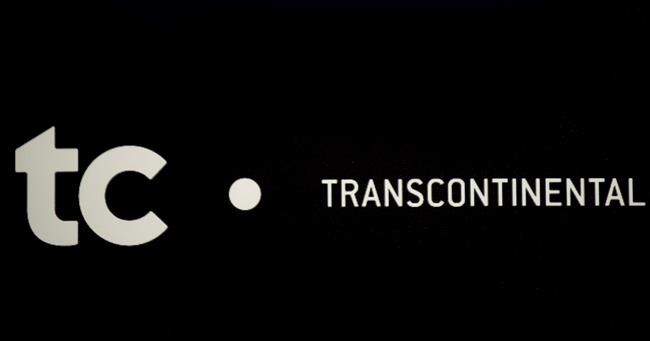Transcontinental recalls more than a third of laid-off printing sector employees
Advertisement
Read this article for free:
or
Already have an account? Log in here »
To continue reading, please subscribe:
Monthly Digital Subscription
$1 per week for 24 weeks*
- Enjoy unlimited reading on winnipegfreepress.com
- Read the E-Edition, our digital replica newspaper
- Access News Break, our award-winning app
- Play interactive puzzles
*Billed as $4.00 plus GST every four weeks. After 24 weeks, price increases to the regular rate of $19.00 plus GST every four weeks. Offer available to new and qualified returning subscribers only. Cancel any time.
Monthly Digital Subscription
$4.75/week*
- Enjoy unlimited reading on winnipegfreepress.com
- Read the E-Edition, our digital replica newspaper
- Access News Break, our award-winning app
- Play interactive puzzles
*Billed as $19 plus GST every four weeks. Cancel any time.
To continue reading, please subscribe:
Add Free Press access to your Brandon Sun subscription for only an additional
$1 for the first 4 weeks*
*Your next subscription payment will increase by $1.00 and you will be charged $16.99 plus GST for four weeks. After four weeks, your payment will increase to $23.99 plus GST every four weeks.
Read unlimited articles for free today:
or
Already have an account? Log in here »
Hey there, time traveller!
This article was published 10/06/2020 (1952 days ago), so information in it may no longer be current.
Transcontinental Inc. says a gradual recovery in printing volumes has allowed it to recall more than one third of the employees laid off because of the impact of COVID-19.
The Montreal-based printer and packaging company says about 600 of the 1,600 temporarily laid-off employees have returned in recent weeks.
“Obviously, things are improving as many businesses are back to business, they’re back advertising,” chief financial officer Donald LeCavalier said in a conference call Wednesday afternoon.

About half of its operations were idled as printed volumes dropped 45 per cent in April.
LeCavalier doesn’t think the printing business will fully recover by early fall but could reach 80 per cent by that time if there isn’t a second wave of infections.
“We’re very dependent on business staying open and businesses in Canada going back to the most normal level of businesses that they could,” he told analysts.
Many retail customers that remained open during the crisis used flyers to communicate COVID-related information and to help build brand loyalty, added chief executive Francois Olivier.
“This crisis has shown that the print flyers remain a relevant and effective marketing tool. It will continue to be very relevant to drive people to stores and help Canadians save money in a challenging economic environment with higher unemployment rate and food price inflation.”
While its printing business has been affected by lower demand for flyers and other products, Transcontinental’s packaging division has been helped by food retailers seeing increased demand during the pandemic.
“Packaging performed very well during the crisis. In a difficult operating environment, we managed to meet increased demand from customers and market-related to food and other essential consumer products, which represents over 80 per cent of our portfolio in this sector,” said Olivier.
The company said Wednesday it earned $25.7 million or 30 cents per share for the period ending April 26, up from $22.3 million or 26 cents per share a year earlier. The improvement resulted from lower financial expenses as its net debt decreased.
Excluding one-time items, adjusted earnings fell 17 per cent to $43.6 million or 50 cents per share from $52.6 million or 60 cents per share in the second quarter of 2019.
Revenue fell 18.5 per cent to $625.1 million from $767.4 million in the year-ago period.
Transcontinental was expected to report 36 cents per share in adjusted profits on $607.9 million in revenues, according to financial markets data firm Refinitiv.
The results beat expectations on a solid quarter for packaging, with EBITDA (earnings before interest, taxes, depreciation and amortization) growing 8.8 per cent to $57 million despite lower revenues, analyst Drew McReynolds of RBC Capital Markets said.
“Consistent with previous management commentary, increased demand from food retailers more than offset volume declines in other verticals,” he wrote in a report.
Printing had a “choppy quarter” as expected with revenues decreasing 20.5 per cent to $265 million and EBITDA down 19.7 per cent to $54 million.
Transcontinental said the sector will face a continued decline in demand for most of its printing businesses that has been amplified by the pandemic, whose future impact remains unpredictable.
“Operational efficiency and cost reduction initiatives taken since the beginning of the fiscal year will help mitigate the impact of volume declines on our operating earnings,” it said.
In addition, it has been helped by pandemic-related products such as signage for physical distancing, Plexiglas panels for several large Canadian retailers and protective visors for local community organizations.
Meanwhile, it expects increased packaging profit markets as a result of synergies, efficiency initiatives and organic growth in the second half of the year.
This report by The Canadian Press was first published June 10, 2020.
Companies in this story: (TSX:TCL.A).

